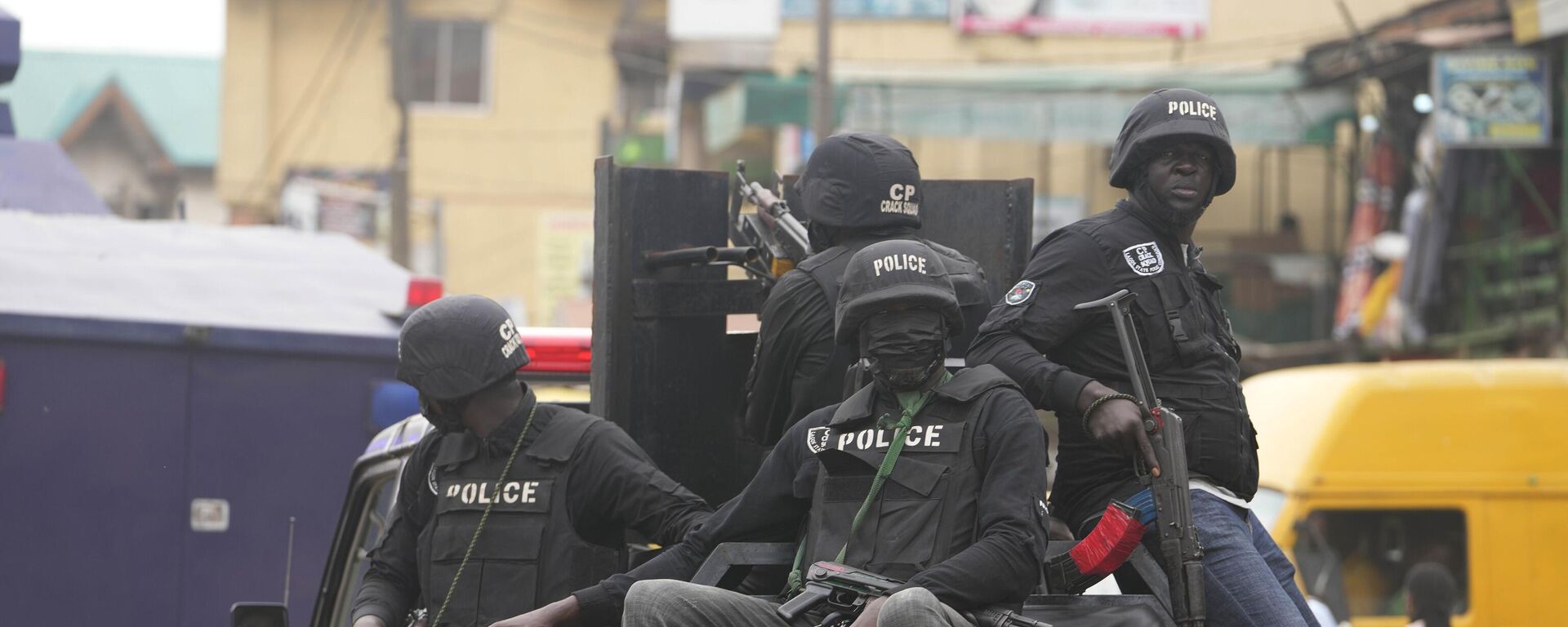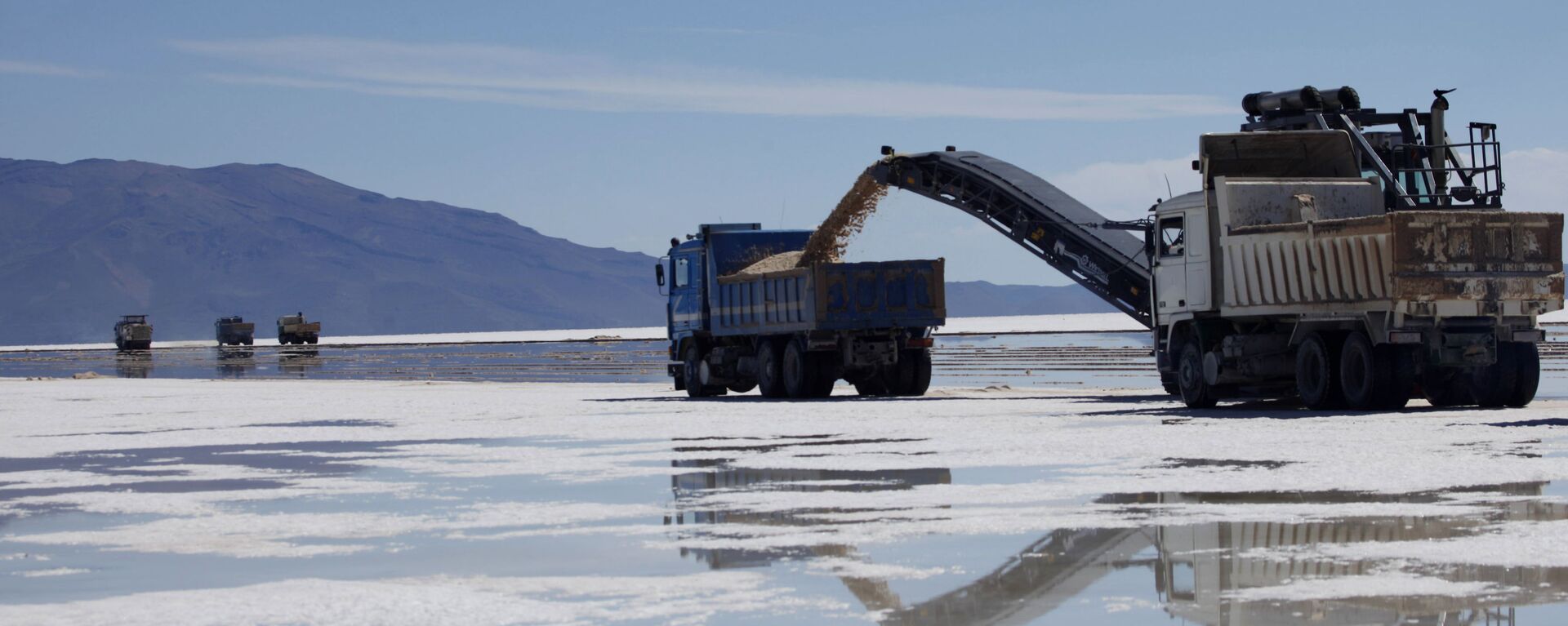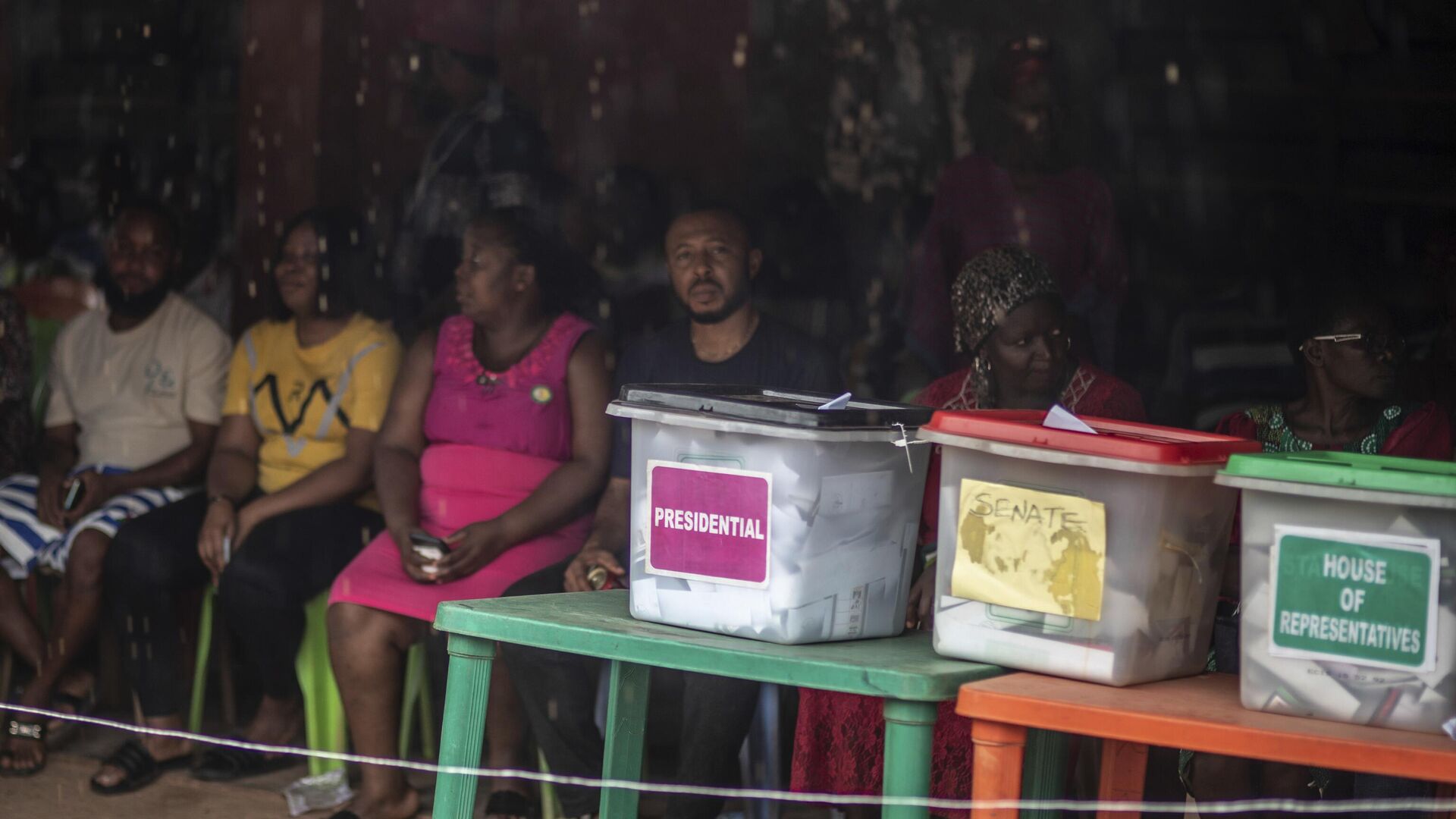https://sputnikglobe.com/20230226/elections-in-nigeria-how-africas-most-populous-country-decides-its-future-1107817376.html
Elections in Nigeria: How Africa's Most Populous Country Decides its Future
Elections in Nigeria: How Africa's Most Populous Country Decides its Future
Sputnik International
Yesterday, Nigeria held general elections voting for both the parliament members and next president. A total of 18 candidates are running for presidential election this year.
2023-02-26T11:42+0000
2023-02-26T11:42+0000
2023-02-26T13:17+0000
africa
west africa
nigeria
general election
presidential election
parliamentary elections
president
vice president
polling
voting
https://cdn1.img.sputnikglobe.com/img/07e7/02/1a/1107817909_0:160:3073:1888_1920x0_80_0_0_55a1186067c0c95d8376aad5ce181556.jpg
With voting officially over, Nigeria's electoral commission is gradually publishing partial results from various local governments and states. According to the initial results, three political parties and their respective presidential candidates are frontrunners vying to lead Africa's largest economy. These three parties, namely the ruling All Progressives Congress (APC), the main opposition Peoples Democratic Party (PDP) and the Labour Party (LP) are taking turns leading in the polls, at times being neck and neck as the results from some polling units showed. The president in Nigeria is elected through a modified two-round system. To win, a candidate must get the most votes, but also secure 25% in two-thirds of Nigeria's 36 states. If no candidate passes this threshold, a runoff election will take place within 21 days between the two frontrunners. Voters also cast their ballot for the country's two houses of parliament, the National Assembly and Senate.As the polling stations closed and people waited for the final results to be revealed with great anticipation, Sputnik takes a look at these elections in more detail. What's New About 2023 ElectionsOne significant difference from previous elections is the size of the electorate, with ten million more people registered to vote in comparison with 2019, including many young voters. According to the Independent National Electoral Commission (INEC), about 93 million are registered, however, only 87 million managed to collect the necessary documents to cast their ballots, in particular, Permanent Voters Cards (PVCs), without which no one is allowed to vote. Another big difference is that for the first time since the military rule ended, a third serious candidate appeared to challenge the dominance of the two Nigerian main parties - APC and PDP. The country's politics have been dominated by these parties for years. The ruling APC is represented at the elections by former Lagos governor and influential political figure Bola Tinubu. His rival, PDP candidate and former vice president Atiku Abubakar, is on his sixth bid for the position. A third-party candidate this year in the race to succeed President Muhammadu Buhari is Peter Obi from the Labour Party, who is largely supported by the younger urban population. New voting technology introduced this year makes the election even more different. Local media reported that INEC is more prepared than in 2019 as it took some vigorous measures to cut down on rigging. In particular, it implemented biometric voter IDs in order to prevent election fraud, while results are being transmitted electronically. Election Day: Delays & Security Issues The elections were generally peaceful despite some incidents that reportedly resulted in minor disruptions and delays in various polling units across the country. Polling stations were scheduled to open at 08:30 am, however, some of them failed to do so as election officials were late or voter ID technology disrupted voting. In the centers where voting machines malfunctioned, voters were told to return later. Thus, they had to wait in lines till the time when the stations were about to close. During a press briefing later on Saturday, the country's electoral chief Mahmood Yakubu apologized for the disruptions, saying that everyone who was in a queue by 02:00 pm would be allowed to cast their vote, even though the election was officially supposed to be over by then.Nigerians shared their experience from voting on social media throughout the day. The citizens posted photos of their fingers stained with special ink used to prevent double voting. The government took serious precautions to avoid unrest on election day. The streets of major cities were mostly calm during the day, as traffic was restricted. Land borders were also closed to ensure the "elections are free, fair and devoid of anomalies," according to the Nigeria Immigration Service. Nevertheless, the electoral chief noted that the election process was disrupted in some areas due to insecurity as armed men attacked polling units in the southern state of Delta and Katsina State in the north. However, security guards took control of the situation and ensured that voting continued. There were also reports of attacks and ballot boxes being carted away in Nigeria's biggest city of Lagos. Meanwhile in Borno state, north-eastern Nigeria, jihadists opened fire on electoral officials, injuring several of them. Attacks on polling stations can't be considered as something new and outstanding to be witnessed during election days in the country. Nigeria is now suffering from insurgent violence as militant groups, who mostly operate in the northeastern region, carry out attacks and kidnappings, targeting rural communities, as well as INEC offices and police. Awaiting Political Statements & ResultsBefore the announcement of official results it's hard to speculate on who will be the winner and the next president of Nigeria. The main candidates all shared that they've participated in the polling, posting pictures of them casting votes on their social media accounts.Incumbent President Muhammadu Buhari even revealed his choice, saying that he voted for his party's candidate Bola Tinubu. Buhari himself is now serving his second and final term, and is constitutionally barred from running for the election. For his part, Tinubu told reporters after casting a vote that he is confident of victory, underlining that "democracy is here to stay" in Nigeria. He also noted that the voting process was "going smoothly." Peter Obi also confirmed that the electoral process was supposedly smooth. According to local media, many opinion polls gave him a substantial lead as this candidate run an effective campaign. His numerous supporters on social media stated after voting that they had exercised their right as "OBIdient" citizens to make better Nigeria "POssible". However, the reports mostly note that it would be difficult for him to convert virtual support seen on social media into enough votes against his powerful rivals. PDP's candidate Atiku Abubakar, for his part, urged Nigerians to do their part and "participate in shaping the future of our dear country."Even though the electoral commission has given no specific timeline, votes are expected to be tallied within several days with results to be announced in up to five days. Some of the counts and the turnout will be known much earlier. INEC began uploading data to its portal around 10:45 pm local time on election evening.
https://sputnikglobe.com/20230224/nigeria-police-arrest-opposition-mp-with-stack-of-money-allegedly-intended-for-vote-buying-1107772001.html
https://sputnikglobe.com/20230225/elections--lithium-mining-why-is-the-us-suddenly-running-get-out-the-vote-ads-in-nigeria-1107784963.html
africa
west africa
nigeria
Sputnik International
feedback@sputniknews.com
+74956456601
MIA „Rosiya Segodnya“
2023
News
en_EN
Sputnik International
feedback@sputniknews.com
+74956456601
MIA „Rosiya Segodnya“
Sputnik International
feedback@sputniknews.com
+74956456601
MIA „Rosiya Segodnya“
west africa, nigeria, presidential elections, polling station, general election, presidential candidates
west africa, nigeria, presidential elections, polling station, general election, presidential candidates
Elections in Nigeria: How Africa's Most Populous Country Decides its Future
11:42 GMT 26.02.2023 (Updated: 13:17 GMT 26.02.2023) On February 25, Nigeria elected both parliament members and the next president. A total of 18 candidates are running for presidential office this year, which is already dubbed by media as the tightest-ever and most competitive race since the end of military rule in 1999.
With voting officially over, Nigeria's electoral commission is gradually publishing partial results from various local governments and states. According to the initial results, three political parties and their respective presidential candidates are frontrunners vying to lead Africa's largest economy.
These three parties, namely the ruling All Progressives Congress (APC), the main opposition Peoples Democratic Party (PDP) and the Labour Party (LP) are taking turns leading in the polls, at times being neck and neck as the results from some polling units showed.
The president in Nigeria is elected through a modified two-round system. To win, a candidate must get the most votes, but also secure 25% in two-thirds of Nigeria's 36 states. If no candidate passes this threshold, a runoff election will take place within 21 days between the two frontrunners.
Voters also cast their ballot for the country's two houses of parliament, the National Assembly and Senate.
As the polling stations closed and people waited for the final results to be revealed with great anticipation, Sputnik takes a look at these elections in more detail.
What's New About 2023 Elections
One significant difference from previous elections is the size of the electorate, with ten million more people registered to vote in comparison with 2019, including many young voters. According to the Independent National Electoral Commission (INEC), about 93 million are registered, however, only 87 million
managed to collect the necessary documents to cast their ballots, in particular, Permanent Voters Cards (PVCs), without which no one is allowed to vote.
Another big difference is that
for the first time since the military rule ended, a third serious candidate appeared to challenge the dominance of the two Nigerian main parties - APC and PDP. The country's politics have been dominated by these parties for years.
The ruling APC is represented at the elections by former Lagos governor and influential political figure Bola Tinubu. His rival, PDP candidate and former vice president Atiku Abubakar, is on his sixth bid for the position. A third-party candidate this year in the race to succeed President Muhammadu Buhari is
Peter Obi from the Labour Party, who is largely supported by the younger urban population.
New voting technology introduced this year makes the election even more different. Local media reported that INEC is more prepared than in 2019 as it took some vigorous measures to cut down on rigging. In particular, it implemented biometric voter IDs in order to prevent election fraud, while results are being transmitted electronically.

24 February 2023, 15:23 GMT
Election Day: Delays & Security Issues
The elections were generally peaceful despite some incidents that reportedly resulted in minor disruptions and delays in various polling units across the country.
Polling stations were scheduled to open at 08:30 am, however, some of them failed to do so as election officials were late or voter ID technology disrupted voting. In the centers where voting machines malfunctioned, voters were told to return later. Thus, they had to wait in lines till the time when the stations were about to close.
During a press briefing later on Saturday, the country's electoral chief Mahmood Yakubu apologized for the disruptions, saying that everyone who was in a queue by 02:00 pm
would be allowed to cast their vote, even though the election was officially supposed to be over by then.
Nigerians shared their experience from voting on social media throughout the day. The citizens posted photos of their fingers stained with special ink used to prevent double voting.
The government took serious precautions to avoid unrest on election day. The streets of major cities were mostly calm during the day, as traffic was restricted. Land borders were also closed to ensure the "elections are free, fair and devoid of anomalies," according to the
Nigeria Immigration Service. Nevertheless, the electoral chief noted that the election process was disrupted in some areas due to insecurity as armed men attacked polling units in the southern state of Delta and Katsina State in the north. However, security guards took control of the situation and ensured that voting continued. There were also reports of attacks and ballot boxes being carted away in Nigeria's biggest city of Lagos. Meanwhile in Borno state, north-eastern Nigeria, jihadists opened fire on electoral officials, injuring several of them.
Attacks on polling stations can't be considered as something new and outstanding to be witnessed during election days in the country. Nigeria is now suffering from insurgent violence as militant groups, who mostly operate in the northeastern region,
carry out attacks and kidnappings, targeting rural communities, as well as INEC offices and police.

25 February 2023, 00:11 GMT
Awaiting Political Statements & Results
Before the announcement of official results it's hard to speculate on who will be the winner and the next president of Nigeria. The main candidates all shared that they've participated in the polling, posting pictures of them casting votes on their social media accounts.
Incumbent President Muhammadu Buhari even revealed his choice, saying that
he voted for his party's candidate Bola Tinubu. Buhari himself is now serving his second and final term, and is constitutionally barred from running for the election.
For his part, Tinubu told reporters after casting a vote that he is confident of victory, underlining that "democracy is here to stay" in Nigeria. He also noted that the voting process was "going smoothly."
Peter Obi
also confirmed that the electoral process was supposedly smooth. According to local media, many
opinion polls gave him a substantial lead as this candidate run an effective campaign. His numerous supporters on social media stated after voting that they had exercised their right as "OBIdient" citizens to make better Nigeria "POssible". However, the reports mostly note that it would be difficult for him to convert virtual support seen on social media into enough votes against his powerful rivals.
PDP's
candidate Atiku Abubakar, for his part, urged Nigerians to do their part and "participate in shaping the future of our dear country."
Even though the electoral commission has given no specific timeline, votes are expected to be tallied within several days with results to be announced in up to five days. Some of the counts and the turnout will be known much earlier. INEC began uploading data to its portal around 10:45 pm local time on election evening.






